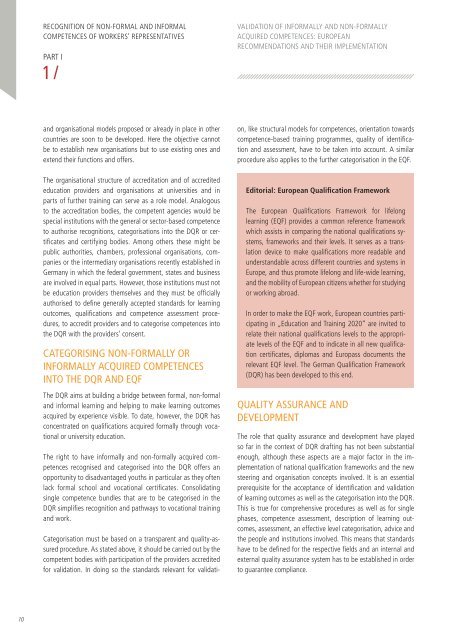RECOGNITION OF NON-FORMAL AND INFORMAL ... - Solidar
RECOGNITION OF NON-FORMAL AND INFORMAL ... - Solidar
RECOGNITION OF NON-FORMAL AND INFORMAL ... - Solidar
You also want an ePaper? Increase the reach of your titles
YUMPU automatically turns print PDFs into web optimized ePapers that Google loves.
<strong>RECOGNITION</strong> <strong>OF</strong> <strong>NON</strong>-<strong>FORMAL</strong> <strong>AND</strong> IN<strong>FORMAL</strong><br />
COMPETENCES <strong>OF</strong> WORKERS’ REPRESENTATIVES<br />
PART I<br />
1 /<br />
VALIDATION <strong>OF</strong> IN<strong>FORMAL</strong>LY <strong>AND</strong> <strong>NON</strong>-<strong>FORMAL</strong>LY<br />
ACQUIRED COMPETENCES: EUROPEAN<br />
RECOMMENDATIONS <strong>AND</strong> THEIR IMPLEMENTATION<br />
and organisational models proposed or already in place in other<br />
countries are soon to be developed. Here the objective cannot<br />
be to establish new organisations but to use existing ones and<br />
extend their functions and offers.<br />
The organisational structure of accreditation and of accredited<br />
education providers and organisations at universities and in<br />
parts of further training can serve as a role model. Analogous<br />
to the accreditation bodies, the competent agencies would be<br />
special institutions with the general or sector-based competence<br />
to authorise recognitions, categorisations into the DQR or certifi<br />
cates and certifying bodies. Among others these might be<br />
public authorities, chambers, professional organisations, companies<br />
or the intermediary organisations recently established in<br />
Germany in which the federal government, states and business<br />
are involved in equal parts. However, those institutions must not<br />
be education providers themselves and they must be offi cially<br />
authorised to defi ne generally accepted standards for learning<br />
outcomes, qualifi cations and competence assessment procedures,<br />
to accredit providers and to categorise competences into<br />
the DQR with the providers’ consent.<br />
CATEGORISING <strong>NON</strong>-<strong>FORMAL</strong>LY OR<br />
IN<strong>FORMAL</strong>LY ACQUIRED COMPETENCES<br />
INTO THE DQR <strong>AND</strong> EQF<br />
The DQR aims at building a bridge between formal, non-formal<br />
and informal learning and helping to make learning outcomes<br />
acquired by experience visible. To date, however, the DQR has<br />
concentrated on qualifi cations acquired formally through vocational<br />
or university education.<br />
The right to have informally and non-formally acquired competences<br />
recognised and categorised into the DQR offers an<br />
opportunity to disadvantaged youths in particular as they often<br />
lack formal school and vocational certifi cates. Consolidating<br />
single competence bundles that are to be categorised in the<br />
DQR simplifi es recognition and pathways to vocational training<br />
and work.<br />
Categorisation must be based on a transparent and quality-assured<br />
procedure. As stated above, it should be carried out by the<br />
competent bodies with participation of the providers accredited<br />
for validation. In doing so the standards relevant for validation,<br />
like structural models for competences, orientation towards<br />
competence-based training programmes, quality of identifi cation<br />
and assessment, have to be taken into account. A similar<br />
procedure also applies to the further categorisation in the EQF.<br />
Editorial: European Qualification Framework<br />
The European Qualifi cations Framework for lifelong<br />
learning (EQF) provides a common reference framework<br />
which assists in comparing the national qualifi cations systems,<br />
frameworks and their levels. It serves as a translation<br />
device to make qualifi cations more readable and<br />
understandable across different countries and systems in<br />
Europe, and thus promote lifelong and life-wide learning,<br />
and the mobility of European citizens whether for studying<br />
or working abroad.<br />
In order to make the EQF work, European countries participating<br />
in „Education and Training 2020“ are invited to<br />
relate their national qualifi cations levels to the appropriate<br />
levels of the EQF and to indicate in all new qualifi cation<br />
certifi cates, diplomas and Europass documents the<br />
relevant EQF level. The German Qualifi cation Framework<br />
(DQR) has been developed to this end.<br />
QUALITY ASSURANCE <strong>AND</strong><br />
DEVELOPMENT<br />
The role that quality assurance and development have played<br />
so far in the context of DQR drafting has not been substantial<br />
enough, although these aspects are a major factor in the implementation<br />
of national qualifi cation frameworks and the new<br />
steering and organisation concepts involved. It is an essential<br />
prerequisite for the acceptance of identifi cation and validation<br />
of learning outcomes as well as the categorisation into the DQR.<br />
This is true for comprehensive procedures as well as for single<br />
phases, competence assessment, description of learning outcomes,<br />
assessment, an effective level categorisation, advice and<br />
the people and institutions involved. This means that standards<br />
have to be defi ned for the respective fi elds and an internal and<br />
external quality assurance system has to be established in order<br />
to guarantee compliance.<br />
10
















